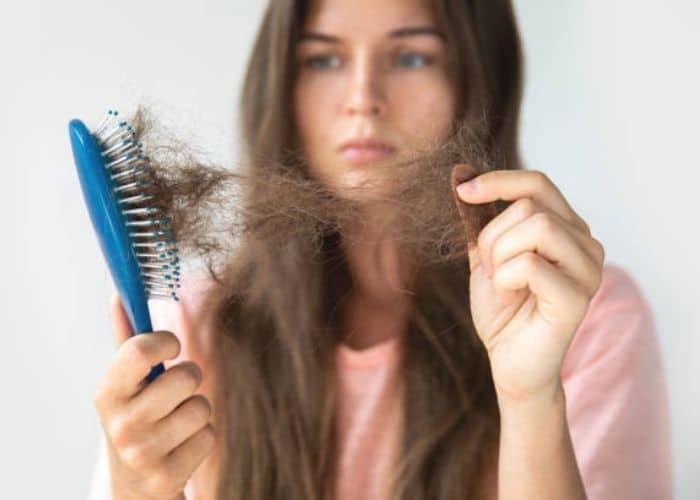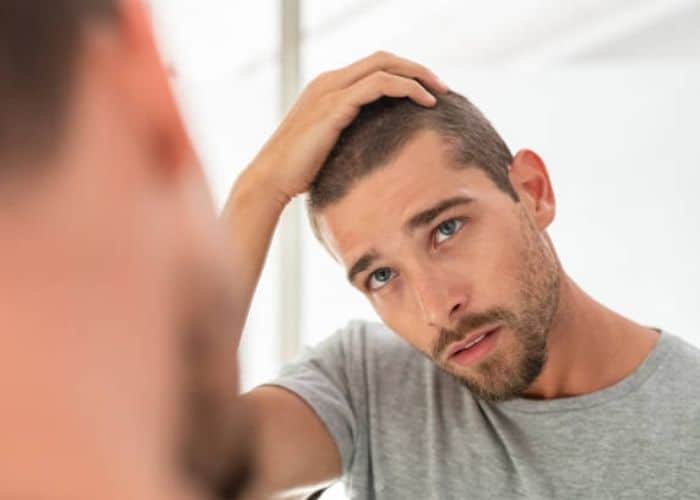Why Does COVID-19 Cause Hair Loss and How to Deal With It?

Quick Summary
The vast majority of hair loss related to COVID is the result of telogen effluvium, a stress-related hair loss.
The good news is that telogen effluvium is reversible, most patients will restore their hair after a period of 6–8 months.
Overview
As the COVID-19 pandemic spread across the globe, reports for hair loss cases skyrocketed. Patients were experiencing hair loss during the infection or shortly after healing.
This story become viral when the Hollywood star, Alyssa Milano, posted a video talking about how she lost her hair after catching the virus.
Scientifically speaking, the Centers for Disease Control and Prevention (CDC) does not classify hair loss as a primary symptom of COVID-19. With that said, many doctors believe hair loss might be a long-term sequela of this infection. For example, dermatologist, Dendy Engelman, said that the cases of hair loss spiked during the pandemic.
In this article, we will cover the relationship between COVID-19 and hair loss, then see how you can reverse this complication.
Why does COVID-19 cause hair loss?
Currently, there is no real evidence that connects COVID directly to hair loss. However, physicians believe that COVID may precipitate reversible hair loss (i.e., telogen effluvium). This results from the enormous physical and emotional stress that COVID patients endure.
Researchers managed to identify clear risk factors and triggers for telogen effluvium, which include:
- Severe emotional distress
- Elevated core temperature for too long
- Complicated surgeries
To understand telogen effluvium, we need to briefly cover the phases of hair growth.
For hair follicles to grow, they undergo several cycles, including:
- Anagen – A long growing phase
- Catagen – A short growing phase
- Telogen – A resting phase
- Exogen – A release phase
Once the final phase ends (i.e., the exogen phase), the hair follicles fall, giving chance for new ones to grow and restart the cycle.
Every day, around 40 hairs reach the exogen phase. This translates to losing around 40 hair follicles per day in women – men can actually lose up to 78 hairs.
All of this is normal. However, if you start losing more than 100 hairs per day, you are no longer dealing with physiological processes.

In telogen effluvium, your hair switches from the catagen phase to the telogen phase abruptly. As a result, the hair starts falling without any new follicles to replace it.
The type of stress caused by COVID-19
Psychological stress is part of the human experience. Common triggers for this stress include family disputes, academic exams, and toxic work environments.
This type of stress is necessary to keep us going and achieve our goals.
With that said, for stress to be beneficial, it needs to be moderate and temporary.
Contrast that with the severe or chronic stress caused by COVID-19. This type of emotional state wreaks havoc on every organ system, including your integumentary system (e.g., hair, nails).
Neuroscientists often fascinate us with new discoveries about the brain. Despite the marvels of the central nervous system, it has several limitations. One key limitation is the inability to differentiate between psychological and physical stress.

In other words, undergoing major stress caused by COVID-19 will be interpreted by your primitive brain as if you are running for your life from a bear. The same biochemical processes occur in both scenarios.
The typical response to this type of stress includes:
- Peaked levels of stress hormones (e.g., cortisol, adrenaline, noradrenaline)
- Tachycardia (i.e., elevated heart rate)
- Minor remodeling of the brain structure
The sympathetic nervous system and COVID-19
The part of your brain responsible for these reactions is called the sympathetic nervous system (SNS). Scientists gave the physiological reaction triggered by the SNS a cool name – the ‘fight or flight’ response.
The elevated levels of stress hormones work on many organ systems to prioritize essential functions.
Examples include:
- Increased blood flow to the brain – Protection for this noble organ
- Increased blood flow to skeletal muscles – Vital for running away from the bear
- Dilates pupils – Essential to view the terrain as you run away from the bear
- Dilates airways – Breathing is important for running
At the same time, the brain puts secondary functions on hold. These include digestion, urine production, reproduction, and hair growth.

It’s for this reason severe stress triggers diarrhea, urine release, and miscarriages. Some of you might think that the brain is stopping secondary functions, such as digesting food and producing urine, so why do stressed people experience diarrhea and urine incontinence?
That’s a very good question. When scientists explored this phenomenon, they found that the SNS exerts potent action on these organs to the point where the antipode system (i.e., the parasympathetic nervous system) reacts abruptly, causing the opposite reactions – diarrhea instead of constipation and urine release instead of anuria.
COVID-19, autoimmune diseases, and hair loss
While the vast majority of hair loss related to COVID is the result of telogen effluvium, there is a subset of patients who experience autoimmune-triggered hair loss.
COVID-19 is caused by a subtype of the coronavirus. As you may know, one of the most common triggers of autoimmune diseases is viral infection.
The name of the autoimmune disease that precipitates hair loss is alopecia areata. Usually, hair loss caused by AA is irreversible. However, early medical intervention may limit the damage.

The issue with AA is that you can’t really tell it apart from other types of hair loss. Therefore, visiting your doctor remains the best course of action in this situation.
Because COVID is such a major disease, it can also impact some organs that cause hair loss. For instance, disrupted thyroid function can easily lead to hair loss.
Speak with your doctor for tailored medical advice.
Tips to prevent stress-related hair loss
The best way to prevent stress-related hair loss is by eating healthy food, exercising more often, and including stress-relieving activities into your routine.
It is also important to get the necessary nutrients that your hair follicles need. If that’s not possible via your diet, opt for supplements.
You should also learn how to control your emotional reactions. Meditation, yoga, and music may help in this area. However, if all fails, you may want to see a therapist who uses cognitive-behavioral therapy techniques.
Treatment – How to regain hair loss from stress
The first thing to do when you experience COVID-related hair loss is to visit your primary care physician or dermatologist. Improving your nutrition and taking supplements can also help.
At some point during your journey, you will get tempted to try the “magical” solutions for telogen effluvium. To save you time and money, we recommend that you don’t try any unusual remedies or products. Instead, focus on eating healthier food, exercising more, and practicing anxiolytic activities (e.g., yoga, meditation). This may help in accelerating your recovery.

Besides that, you can try the following tips:
- Natural home remedies that you used to do before.
- Post Covid hair loss treatment at home.
- Avoid hairstyles that pull on your hair – this may lead to traction alopecia.
- Heating, bleaching, perming, and dyeing are a big NO!
Frequently Asked Questions (FAQs)
1. When does COVID-related hair loss typically start?
There is no rule when it comes to COVID-related hair loss.
In general, your hair will start to fall after 2–3 months of the beginning of stress. Therefore, depending on the duration of your illness, hair loss may either occur during or after the infection.
For instance, some patients took over 3 months to completely recover from COVID. These patients may experience hair loss before they completely heal.
For the vast majority of patients who heal from COVID after 2 to 3 weeks, telogen effluvium mostly occurs after healing.
2. How long does COVID hair loss last?
Most patients restore their hair after a period of 6–8 months. Adopting a healthier lifestyle can help with shortening this duration.
However, if AA is the cause of your hair loss, the damage may be irreversible.
3. Can you regrow your hair after suffering from telogen effluvium?
Typically, telogen effluvium causes 300 hair follicles to fall per day.
The good news is that this condition is reversible. After a few months, your hair will grow back to normal without any interventions.
4. What you can also do about hair loss after COVID?
After understanding telogen effluvium and the fact that it takes time to reverse, you may want to consider temporary solutions. For instance, using a comfortable wig or hair system can help in hiding your thinning hair.
Interested in wigs or hair systems? Check out our collection of men’s hair system and women’s wigs below for more information.
Men
Women’s Wigs and Toppers
Takeaway message
Stress-related hair loss, or telogen effluvium, is an extremely common condition that most people are unaware of. Unfortunately, desperate patients spend thousands of dollars on solutions that use pseudoscience without any evidence of real effectiveness.
We hope that this article helped you understand the relationship between COVID and hair loss, as well as the ways to deal with it.
If you have any questions or concerns about COVID-related hair loss, feel free to share your thoughts in the comment section below.
If you need any help in investing in a wig or hair system to hide the thinning hair temporarily, you can also reach out to us for a conversation via this link.
Inquiries
Hey, let's keep in touch!
Be the first to get exclusive offers, in-stock updates, tips and more.




